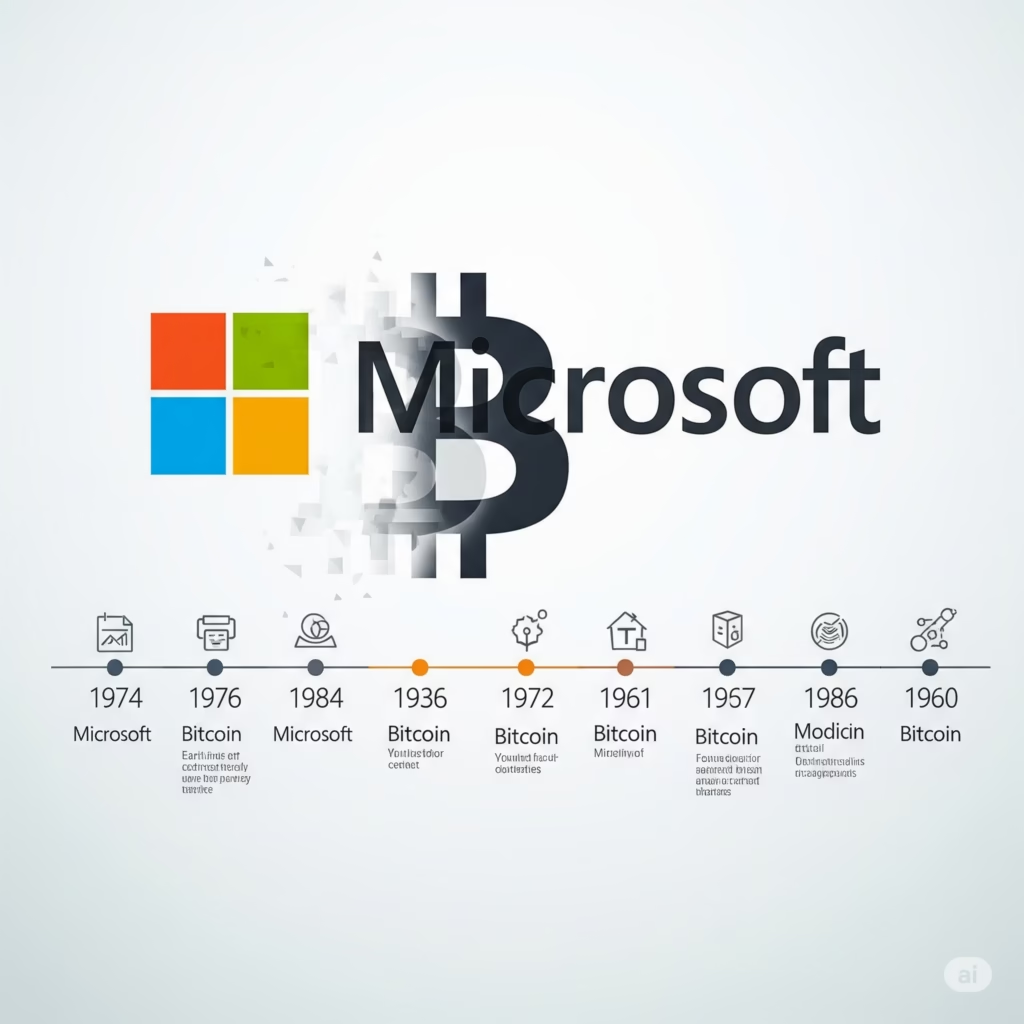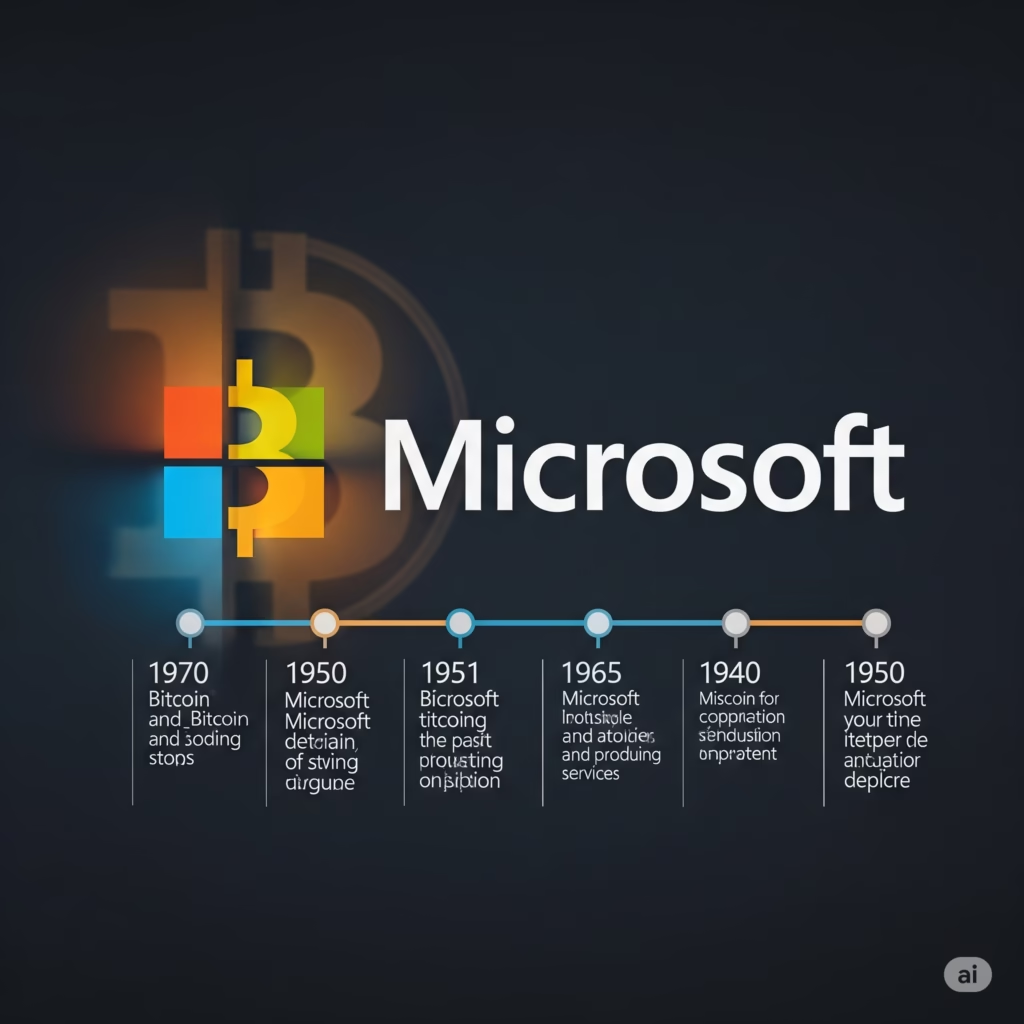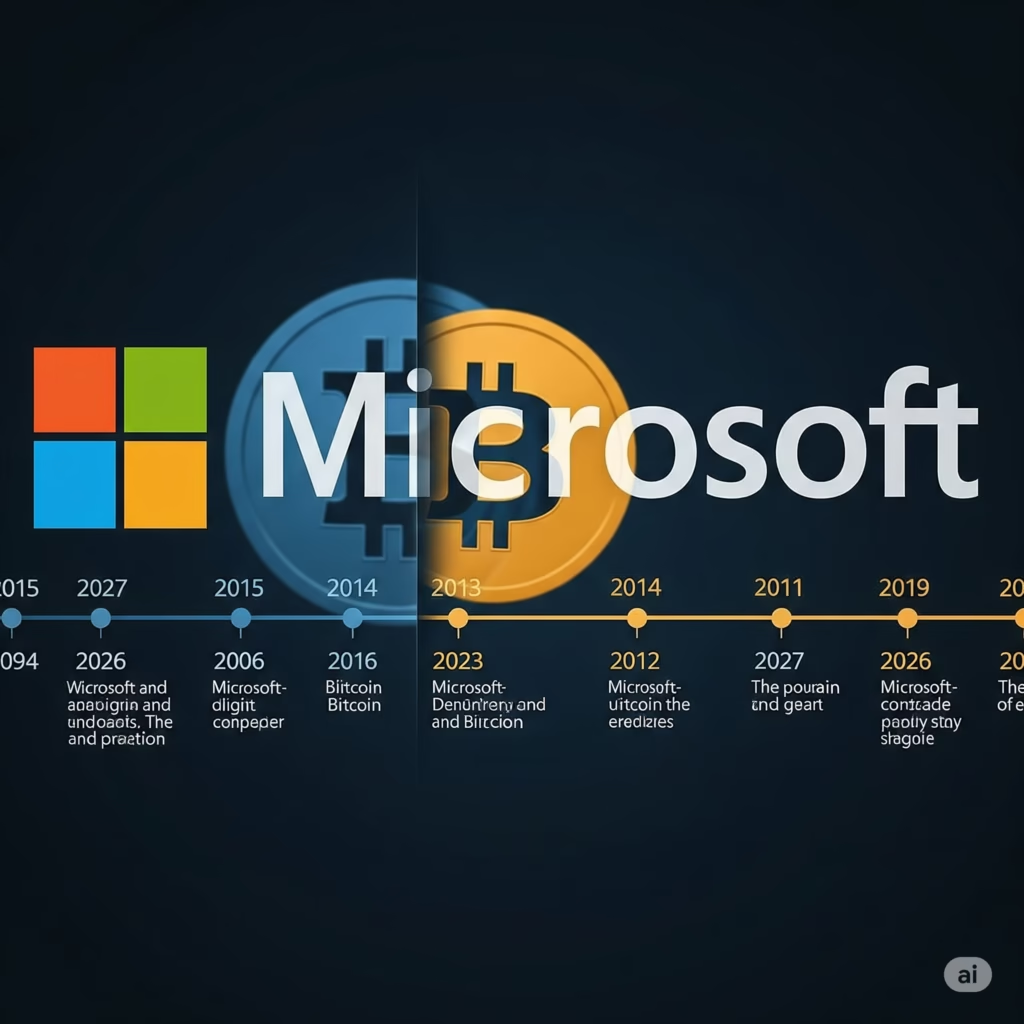Table of Contents
1: The Shockwave
In a rapidly evolving crypto landscape, the decision by Microsoft to reject Bitcoin as a payment method sent ripples through the industry. Once viewed as a potential leader in corporate crypto adoption, Microsoft’s sudden pivot away from Bitcoin raised eyebrows across tech and finance sectors.
The rejection of Bitcoin by a Big Tech titan like Microsoft is not just a business decision — it’s a signal. It prompts the world to ask: is Bitcoin still viable as a means of exchange, or is it being relegated to digital gold status only? In this article, we analyze Microsoft’s history with Bitcoin, their rationale behind rejection, expert reactions, and what this move means for the future of crypto.

2: Microsoft and Bitcoin — A Brief History
Microsoft’s relationship with Bitcoin dates back to 2014, when it began accepting BTC for purchases of Xbox games and Windows apps. This made headlines and was perceived as a bullish step for mainstream adoption. Over time, Bitcoin payments were quietly de-emphasized and eventually disabled, resurfacing briefly before being shut off again in 2018.
Microsoft also explored blockchain deeply through its Azure Blockchain Service, positioning itself as a back-end infrastructure provider for decentralized applications. It supported Ethereum and had partnerships with ConsenSys and Hyperledger. However, the company remained non-committal on cryptocurrencies themselves.
Brad Smith, Microsoft President, once said:
“We’re not jumping on the cryptocurrency bandwagon… but we see potential in decentralized identity and smart contracts.”
3: The Recent Decision to Reject Bitcoin
In 2023, Microsoft officially confirmed the removal of Bitcoin as a payment option, citing concerns about price volatility, transaction speed, and environmental footprint. In its updated support documentation, Microsoft stated:
“Due to market instability and the need for secure and scalable payment experiences, we are no longer supporting Bitcoin payments.”
The quiet rollout of this policy didn’t stop it from sparking conversations globally.

4: Industry and Expert Reactions
CoinDesk analysts noted the irony:
“Microsoft helped validate Bitcoin in the early 2010s, but now it’s sidelining it during a period of institutional resurgence.”
Vitalik Buterin, co-founder of Ethereum, responded indirectly by tweeting:
“Crypto adoption must go beyond payments — identity, security, and digital ownership will define the next wave.”
Elon Musk also commented on the topic in a broader crypto conversation, stating:
“Companies are too quick to adopt or reject Bitcoin without understanding the long-term implications.”
5: How This Affects the Bitcoin Ecosystem
Microsoft’s move did not trigger a major price drop but did stir a wave of skepticism among institutional investors.
According to Glassnode, Bitcoin’s transaction count from corporate addresses dipped by 4% in the week following the announcement. This shows perception does matter — especially when it comes from a trillion-dollar company.
Arcane Research highlighted that:
“Bitcoin’s credibility depends less on one company and more on its global narrative as a hedge against fiat and inflation.”
6: Microsoft’s Alternative Blockchain Strategy
While Bitcoin was rejected, blockchain was not. Microsoft continues to invest in decentralized ID (DID) technologies like ION, which uses the Bitcoin blockchain to anchor identifiers — ironically still relying on BTC infrastructure.
They also filed patents related to:
- Web3 identity systems
- Crypto-based cloud access tokens
- Metaverse interoperability tools
Azure is now focusing on enterprise blockchain services for supply chain, healthcare, and finance clients — but steering clear of direct crypto exposure.
7: Is Microsoft Playing It Safe or Falling Behind?
While Microsoft plays it safe, its competitors are not far behind:
- Google: Partnered with Coinbase for cloud payments
- Meta: Despite Diem’s failure, it’s exploring crypto wallets and NFTs
- Apple: Filed patents for crypto wallet interfaces
MIT Tech Review stated:
“In rejecting Bitcoin, Microsoft may be avoiding short-term volatility but risks being absent from the Web3 payment layer.”
8: What This Means for Crypto Adoption
The move reveals a larger trend: corporates prefer stablecoins over volatile assets like Bitcoin for payment use cases.
PYUSD, USDC, and now RLUSD (Real USD) are rising in prominence. These tokens offer the stability and compliance framework companies prefer.
RLUSD, for instance, is gaining traction in enterprise environments thanks to its U.S. treasury backing and audited transparency.
“RLUSD: The Future of Stablecoins”
9: Public Opinion — What Users Really Think
Crypto communities on Reddit (r/Bitcoin) and X (Twitter) expressed disappointment, calling Microsoft’s decision “short-sighted”. Others were pragmatic:
“Bitcoin wasn’t meant to be a corporate payment method — it’s freedom money.”
Younger users in India, the UK, and Canada were more vocal in supporting decentralized platforms like Lightning Network over centralized giants.
10: Most Asked Questions Online — Answered
Q1: Why did Microsoft stop accepting Bitcoin? A: Mainly due to volatility, security concerns, and evolving payment infrastructure strategies.
Q2: Does Microsoft support blockchain? A: Yes, heavily. Through Azure Blockchain Services, patents, and identity solutions.
Q3: Will Microsoft accept crypto again? A: Possibly stablecoins like RLUSD, but unlikely to be Bitcoin in the near term.
Q4: Which major companies still accept Bitcoin? A: Tesla (occasionally), Overstock, Newegg, Twitch, and select Shopify merchants.
11: What’s Next? The Future of Bitcoin Adoption
While Microsoft backs off, other forces push Bitcoin forward:
- Bitcoin ETFs approved in the U.S.
- BlackRock, Fidelity, and ARK Invest heavily accumulating BTC
- El Salvador doubling down on national BTC strategies
The Bitcoin Lightning Network is growing fast, enabling micro-transactions and real-world use in Africa, India, and Latin America.
12: Final Verdict — Missed Opportunity or Strategic Patience?
Microsoft rejecting Bitcoin may seem like a step backward, but it might be a calculated pause. The company is betting on blockchain infrastructure, identity, and enterprise applications, rather than volatile assets.
Yet, in doing so, it risks missing out on defining the financial rails of the future. As the crypto economy matures and regulation becomes clearer, the pressure on Microsoft to re-enter the payments space with a crypto solution will only grow.
The world isn’t waiting — and neither is Bitcoin.
Microsoft shareholders voted down a proposal to add Bitcoin (BTC) to the company’s balance sheet, dismissing hopes within the crypto community that the tech giant might follow in the footsteps of Bitcoin advocates like MicroStrategy.
The proposal, brought forth by the National Center for Public Policy Research, urged Microsoft to allocate 1% of its $78 billion in cash and marketable securities to Bitcoin as a hedge against inflation.
However, Microsoft’s board advised shareholders to oppose the move, citing Bitcoin’s notorious price volatility and the company’s preference for secure investment strategies.

In a recent development, Microsoft shareholders have voted against a proposal to allocate a portion of the company’s assets to Bitcoin (BTC), opting instead to maintain traditional investment strategies. This decision reflects the company’s cautious approach toward the volatile cryptocurrency market.
The Proposal and Its Advocates
The initiative, introduced by the National Center for Public Policy Research, a conservative think tank, recommended that Microsoft invest at least 1% of its $78 billion in cash and marketable securities into Bitcoin. The proponents argued that Bitcoin serves as an excellent hedge against inflation, especially in uncertain economic times.
Michael Saylor, co-founder and executive chairman of MicroStrategy, a company known for its substantial Bitcoin holdings, supported the proposal. In a presentation to Microsoft’s board, Saylor contended that investing in Bitcoin could significantly enhance Microsoft’s market value, potentially adding trillions of dollars. He emphasized Bitcoin’s role as “digital capital,” superior to traditional assets in preserving value against financial risks.
Microsoft’s Position
Despite these endorsements, Microsoft’s board of directors recommended that shareholders vote against the proposal. The board expressed concerns about Bitcoin’s notorious price volatility and highlighted the company’s commitment to secure and predictable investment strategies. They noted that Microsoft’s Global Treasury and Investment Services team regularly evaluates various investment options, including cryptocurrencies, to ensure the company’s financial stability.
Amy Hood, Microsoft’s Chief Financial Officer, elaborated on this stance during the annual shareholder meeting. She acknowledged that while Microsoft has accepted Bitcoin as a form of payment since 2014, the company prioritizes liquidity, capital preservation, and income to fund operations and investments. Hood stated that the treasury team continuously assesses different asset classes, including cryptocurrencies, but maintains a focus on stable investments to support the company’s long-term objectives.
Shareholder Decision
The shareholders aligned with the board’s recommendation, voting against the proposal to invest in Bitcoin. This decision underscores a preference for traditional investment avenues over the potential high-risk, high-reward nature of cryptocurrencies. It also reflects a cautious approach, considering the regulatory uncertainties and market volatility associated with digital assets.
Broader Context
Microsoft’s decision comes at a time when corporate adoption of Bitcoin remains limited. While companies like MicroStrategy have aggressively invested in Bitcoin, amassing over 400,000 bitcoins valued at approximately $40 billion, such strategies are not widespread among large corporations. Tesla, for instance, holds about $1 billion in Bitcoin but has not made recent significant acquisitions.
The reluctance of companies like Microsoft to invest in Bitcoin highlights the ongoing debate over the role of cryptocurrencies in corporate finance. Factors such as regulatory scrutiny, market volatility, and the need for liquidity and capital preservation continue to influence corporate investment decisions regarding digital assets.
Conclusion
Microsoft’s shareholders have chosen to adhere to traditional investment strategies, reflecting a cautious approach to the integration of volatile assets like Bitcoin into corporate treasuries. This decision aligns with the company’s commitment to financial stability and predictable growth, amidst the evolving landscape of digital currencies.



